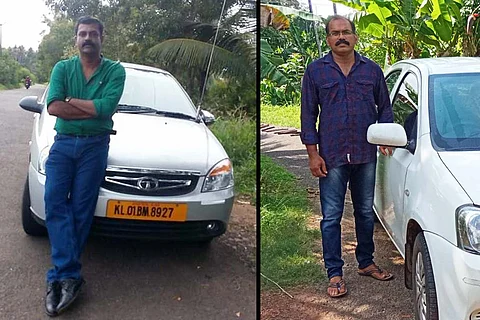

Seventy-eight-year-old Devaki walking around collecting firewood was a common sight for her neighbours in Kerala’s Thiruvananthapuram district, about 8 km from the capital. Her son, a daily wage worker, did not allow her to use a gas stove. If someone tried to help Devaki, he would shout at them. When COVID-19 struck in 2020 and the lockdown was imposed, Usha, a neighbour, sold her gold earrings to get Devaki a gas connection. In a residential area with more than 5,000 people, Usha was the only one who stood up for Devaki.
The pandemic has turned out to be a time for hope and humanity. Usha also provides lunch to five people daily during the lockdown, which she did in 2020 as well. However, she doesn’t want the media to report any of this, wishing to remain anonymous. Like Usha, there are hundreds who are quietly helping those around them. Among them are Roy and his four friends – Siju, Thambi, Biju and Dileep, taxi drivers from Ernakulam district. Ever since the pandemic hit the state badly last year, they have been on a mission to transport COVID-19 patients.
The five of them take patients to the hospital, bring them back home after discharge, shift patients to quarantine facilities, transport patients from airports, etc. They are also called by local government bodies to ferry patients. Apart from that, individuals, organisations and hospitals also call them for help. What makes them stand out is that they don’t insist on payment from patients. When they think that the people who board their cab are not able to afford it, they transport them for free.
Above all, these humanitarians had to make many personal sacrifices while opting to work for COVID-19 patients.
Roy recalls how a large group of people tried to attack him and his family. “When I started transporting patients, people living nearby gathered together against me. They said my car shouldn’t be parked in the locality. They didn’t want me to live near them because of fears of COVID-19 spread. Finally, I drove my car and parked it far away, but there also people gathered and threatened to burn the car down. I ran out of fear,” he says recollecting the nightmare.
He also recalls how his family, including four children, had to stay locked up inside their home fearing a mob attack. “I had to shift to another house in a different panchayat,” he adds.
Roy says he has transported more than 500 patients. “Yesterday I got a call for help. When I reached the house, the COVID-19 patient was lying on the floor. He had had a cardiac arrest. No one touched the person, but I gave him CPR and took him to the hospital. But by the time we reached the hospital, he died. In the last one year, I have experienced many heartbreaking situations that I’d never faced in my life before,” he says.
When transporting a COVID-19 patient, Roy and the other drivers ensure they follow all protocols and take precautions to keep themselves safe. None of them has been infected with the virus.
Roy started his initiative by ferrying COVID-19 patients from the airport last year, at a time when many hesitated to do so. “I spend money from my pocket to buy PPE kits, sanitisers and all other safety gear. Some passengers can’t afford it, so I don’t take any payment from them. Some have credited the payment to my account later when they have the money. Though there are financial constraints, I’m happy about what I’m doing,” he adds.
These drivers have lived through the most painful side of COVID-19. Patients have died inside their vehicle, some vomiting blood, some due to cardiac arrest. But the sight of death hasn’t scared them. “It is because of this that we try to save more lives as possible,” Roy says.
Dileep, Roy’s friend, shares that they don’t get other trips. “When people come to know that we transport COVID-19 patients in our cab, they just cancel the trip. People are scared. But it’s a difficult time for all of us, we need to help each other,” he adds.
The drivers are ready to take up a trip for COVID-19 patients all 24 hours. They don’t show any hesitation to touch the patients, if necessary. They also shift people who test positive for coronavirus from their office to home or to treatment centres to remain in quarantine.
They have certain requests to the government. They would like to have some oximeters as well as oxygen facility in their cabs to use while transporting critical COVID-19 patients. They also point out the need for getting the vaccine as they are silent frontline COVID-19 warriors too.